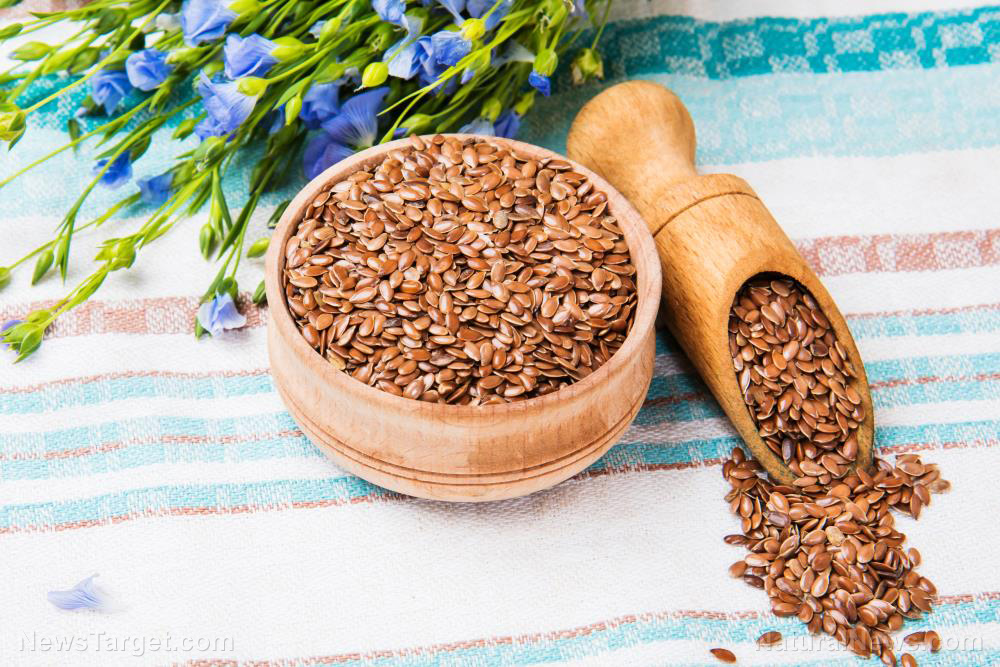Why everyone needs a little more flax in their diet
11/14/2018 / By Tracey Watson

So many nutritionally-dense superfoods have been highlighted by natural health proponents in recent years, that it can be quite confusing to know which ones are really the most important and how to incorporate them into our daily diets. Not all superfoods are equal, however, and some offer more health benefits than others. One of the foods that stands head and shoulders above many other, even really nutritious foods, is flax.
Flax is one of the world’s oldest known fiber crops. It was planted in both ancient China and Egypt, and has been part of Indian Ayurvedic medicine for millennia. There are two types of flax seeds (also known as linseeds) – brown and golden – and both are equally nutritious. These amazing little seeds are high in fiber while being low in calories and are packed with vitamins, minerals and other nutrients, making them a nutritional powerhouse.
“Flax beautifies you … inside and out”
On a recent Brighteon.com informational clip, Derek Henry, founder of Healing the Body, explained that flaxseeds can easily stand up to superfood competitors like hemp seed, but that the key to unlocking their benefits is to consume them ground, as an oil, or steeped in hot water and made into a tea.
Some of the amazing nutrients included in these tiny seeds are: essential fatty acids (especially Omega-3s), vitamin E and the B vitamins, protein and plant lignans. Flaxseeds are also packed with minerals, including manganese, magnesium, selenium, zinc, phosphorous, copper, iron, calcium and potassium.
HealthLine notes that for vegetarians or those who don’t eat much fish, flaxseeds can be the best way to boost omega-3 fat consumption, since they are high in alpha-linolenic acid (ALA), a mostly plant-based omega-3 fatty acid:
ALA is one of the two essential fatty acids that you have to obtain from the food you eat, as your body doesn’t produce them.
Animal studies have shown that the ALA in flax seeds prevented cholesterol from being deposited in the blood vessels of the heart, reduced inflammation in the arteries and reduced tumor growth.
A Costa Rican study involving 3,638 people found that those who ate more ALA had a lower risk of heart attack than those who consumed less ALA.
Also, a large review of 27 studies involving more than 250,000 people found that ALA was linked to a 14% lower risk of heart disease.
Numerous studies have also linked ALA to a lower risk of stroke.
Derek Henry noted that many who increase their flaxseed consumption notice significant improvements in their digestion and colon health, experience healthier cholesterol levels, notice that the condition of their skin and hair improves, find that it’s easier to maintain their weight, and benefit from a boost in their immune function.
“Bottom line: Using flax on a daily basis beautifies you – inside and out,” Henry added. (Related: Why flax seeds may be the best source of omega-3s.)
Suggestions for consuming more flax
As already noted, the best way to consume flax is ground, as an oil, or steeped into a tea. Henry included some useful suggestions on how to easily incorporate flaxseed into your diet:
- Sprinkle some on your cereal
- Add a dash of flaxseed and cinnamon to warm berries
- Mix some in with whatever sauces you might be eating
- Enjoy a little with yogurt
- Incorporate ground flax in your morning smoothie
- Choose flaxseed oil for your salad dressings
- Enjoy a slice of flaxseed and almond flour chocolate cake
It might require a little thought and extra effort to consume more flaxseeds, but the benefits reaped make doing so totally worthwhile. Discover more of nature’s secrets at Nutrients.news.
Sources for this article include:
Submit a correction >>
Tagged Under:
This article may contain statements that reflect the opinion of the author
RECENT NEWS & ARTICLES
COPYRIGHT © 2017 SUPER FOODS NEWS





















